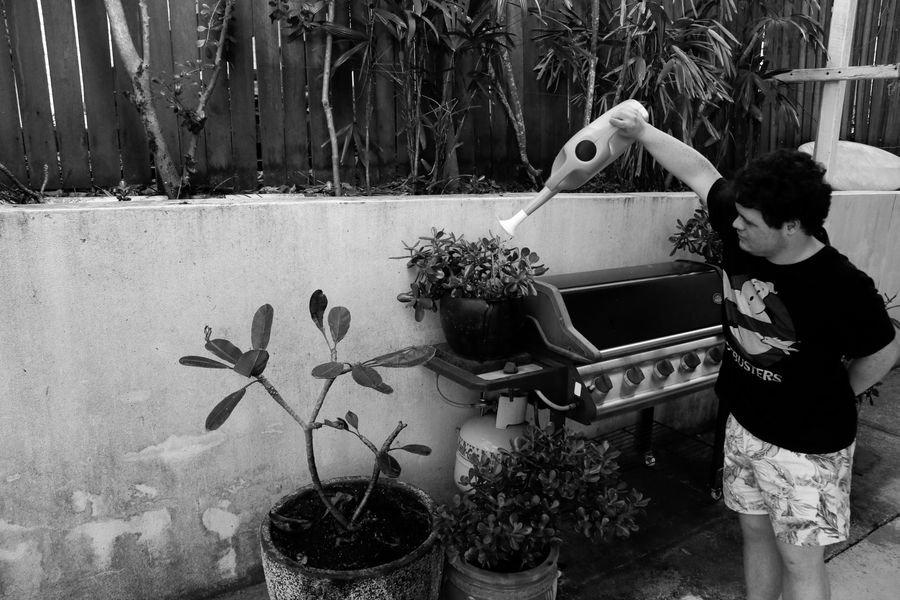
LOCKDOWN FOR RILEY
I have known Riley Harris for three years now. We first met in 2018 when I began coaching the rugby team he plays with down at Wests. More recently I have been employed as his support worker. Riley and I endured the ebb and flow of the lockdown woes every Tuesday as the COVID crisis unfolded.
I would arrive at eight, and the first business of the day would be to cycle along Ithaca Creek to a local set of bike jumps. Upon returning, Riley and myself would walk up to the shops for lunch. Riley still rings the bells on the bikes as we pass a store on the way to IGA. From there Riley would get his chocolate milk, before heading across to the bakery from to get his sausage roll. Once home, Riley would have a few minutes to sit down and have lunch before his online speech therapy appointment.
Many things have changed since lockdown. Here in Queensland we’re almost back to normal. Although even with rugby training back on and kicking off in three hours, Riley still does “Robot Talking”, as he and his speech therapist call it, to his mother’s MacBook screen.
But other things have returned to normal for Riley. Most importantly, we can play rugby again.
~
Riley has down-syndrome, in recent years the NDIS (National Disability Insurance Scheme) has allowed young men and women like Riley to enjoy the normalities of everyday life. Going out to work, getting out of the house without a family member, living life with dignity and independence.
Since widespread implementation of the NDIS, many people who live with a disability have gained a whole new lease on life. Before the funding that the NDIS provides came in. Care would be given by family members. External support was rare or expensive and so for many families, their life was one of isolation.
The landscape has been changing drastically. People with disabilities are now able to hold jobs, join sports teams, dance groups, spend days out pursuing hobbies and past times.
But then, as it did for all of us, COVID hit. We were sent fleeing into our homes. Our lives uprooted and raw as we adjusted to the new normal.
The use of “fleeing” isn’t an over exaggeration. COVID for many like Riley is potentially lethal as many with disabilities are immune-compromised.
This meant that the disability community was disproportionately at risk. Many had to stop working, cease social activities and entirely disconnect from their day to day lives. Returning to an eerily familiar sense of isolation.
Riley was fairly lucky. His days were spent with support workers, doing odd jobs around the house in-between napping and sneaking extra cookies.
But some weren’t so fortunate.
~
Anthony Ryan is the CEO of YoungCare.
“So, in a precautionary manner, what they did was they locked down immediately. Not only in their own homes but their own bedrooms.”
During lockdown, the staff at YoungCare saw a dramatic shift in one of their free helplines.
“People were really ringing us for no other reason than to chat.”
YoungCare connect, as it’s called, is generally a line people with disabilities and their families can call for housing and care options, advocacy issues etc. But while many of the young adults they care for faced an unprecedented stint in isolation, the helpline became a lifeline. A way to escape the confines of the rooms in which many young Australians were isolated for days and even weeks on end.
The rate of calls went up drastically during lockdown, with YoungCare connect receiving over a thousand calls per month during the lockdown period.
Anthony also noted as to how many young Australia’s living with disabilities would have been fast tracked from hospital beds into aged care to free up resources in anticipation for the pandemic while also trying to protect the more vulnerable of our population.
Aged care is a place to relax and celebrate a life well lived. Not a point from which young Australians should look to live their lives. The unsung tragedy of this pandemic will be those of our community. Who in the flurry and chaos of our pre-COVID preparation, were lost to a system already severely lacking.
~
For those healthy, generally the concern was for others. We knew that if the virus spread, the more vulnerable of our population would die. And for those compromised, the concern playing on their minds was that of life and death.
Riley’s social life and work couldn’t be moved online. For him and thousands of others within our community life came to a grinding, all too familiar halt.
Despite this, often when working with Riley he would turn to me, and with the limited speech he uses ask “you good?”







